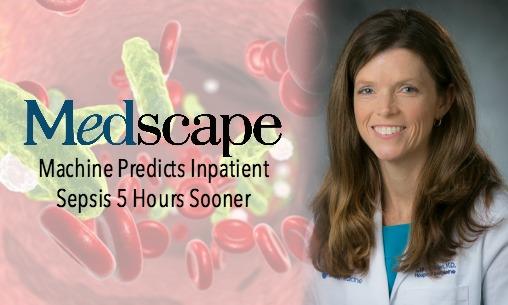
This week Medscape Medical News talked with Duke Hospitalist, Dr. Cara O’Brien about her award winning research.
O’Brien was the senior author of a remarkable study about improving early detection of sepsis. The abstract — “Deeply-Personalized Medicine: Bringing Deep Learning to Sepsis Care” — received one of the Top 15 Finalist Awards for the “Best of Research and Innovations in 2018” at the Society of Hospital Medicine recent annual conference in Orlando. As a finalist Dr. O'Brien was invited to give an oral presentation at the meeting, April 10, 2018.
To explain a little about the science many previously called data mining, the researchers took advantage of machine learning, a field of computer science which is the practice of using algorithms to parse data, learn from it, and then make a determination or prediction about something. Deep learning breaks down the tasks further. Altogether the science is bringing us closer to application of artificial intelligence.
Applying their knowledge of informatics, the Duke team was able to examine 43,046 adult inpatient admissions, analyze the data points and come up with 83 predictor variables. Their approach consistently outperformed other methods. This is key, as every hour delay in the diagnosis of sepsis matters. They presented a sample patient where they were able to detect sepsis 17 hours prior to the first antibiotic administration for infection and 36 hours before a sepsis definition was met.
The team now has the model. As Anthony Lin, the first author of this abstract says, “Watch for further application, perhaps cardiogenic shock is next!”
The abstract appears in the Journal of Hospital Medicine.
Lin, A; Futoma, J; Sendak, M; Bedoya, A; Clement, M; Gao, M; Nichols, M; Heller, K; O'Brien, C. DEEPLY-PERSONALIZED MEDICINE: BRINGING DEEP LEARNING TO SEPSIS CARE [abstract]. Accessed April 13, 2018.